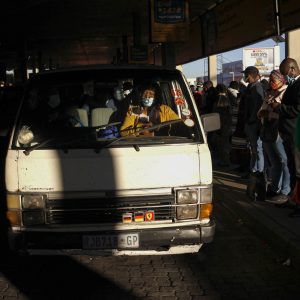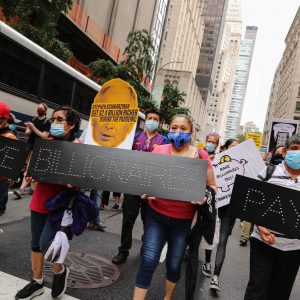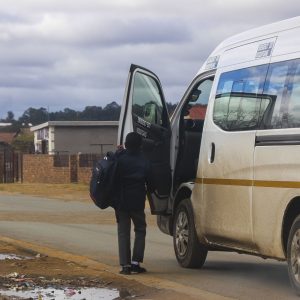Government support the only way, says taxi industry
The price of petrol continues to rise but commuters cannot afford a ticket hike and minibus, metered taxi and e-hailing drivers are still struggling with Covid setbacks.
Author:
30 May 2022

Escalating fuel prices are devastating a transport industry that had barely recovered from the restrictions imposed during Covid-19 lockdowns. Drivers and owners of minibus taxis, metered taxis and those in the e-hailing industry in South Africa are feeling the pinch.
“The problem we are facing is petrol, especially for bigger cars. Every person who is using a Toyota Quest and all the bigger cars, we are facing a major challenge because ipetrol iyasibulala (petrol prices are killing us). So, we are just working to survive,” says Mlungisi Mokoena*, who has been an Uber driver for seven years.
The price of petrol is expected to increase by R2.25 in June. On top of this, the National Treasury is reinstating the R1.50 per litre general fuel levy that it suspended in April and May, pushing the cost up further.
Related article:
“It’s an unprecedented situation that we find ourselves in as an industry,” says Theo Malele of the National Taxi Alliance.
Mokoena spends well over R3 000 a week on fuel. “To make your day’s target, you must spend money on petrol. By the time you make R1 000, you have already spent a lot of money on petrol. I have two children and a wife. I am the only one who works. I must pay school fees monthly. It is difficult to manage all these things.”
Fares and fuel prices
Escalating fuel prices and the documented exploitation of e-hailing drivers forced them to take to the streets in March. They went on strike to call for an increase in fares, so they can earn a decent living. The South African Taxi Association has said it is looking into increasing fares, given the rapid rise in the price of petrol. Malele says that as an industry, they are left with no choice.
The strain on the industry has been compounded by the pandemic, during which millions of jobs have been lost. International Labour Organization director general Guy Ryder says in the World Employment and Social Outlook: Trends 2021 report that “the salient impact of the Covid-19 crisis has been the worsening of long-standing structural challenges and inequalities in the world of work, undermining recent progress in poverty reduction, gender equality and decent work”.
Global unemployment for 2022 is expected to surpass the 2019 level of 187 million people to around 205 million people, says the report. Young people, mostly from the Global South, are affected most. In South Africa, the unemployment rate among young people is at a staggering 65.5%.
Related article:
Mokoena says the beginning of the pandemic and the restrictions it came with “was a really difficult time. We really suffered at the beginning of the hard lockdown as Uber drivers.” January and February are generally tough months for business. But at the start of 2020, when the pandemic was spreading across the country, “business-wise … in terms of money, it was bad my brother”.
In an attempt to ease the pressure on consumers, financial institutions introduced a three-month payment holiday on car and home loans in late March 2020. Mokoena didn’t qualify as he was already behind on his payments. “That really impacted me. And I know that a lot of Uber drivers are really struggling. Even today, I am behind with my car payments. I am in arrears of about R8 000,” he says.
The bank handed Mokoena’s account over to debt collectors and he now has an agreement to pay R1 600 a week to service his debt, along with his monthly loan repayment of R4 474.
Making things more difficult for people like Mokoena is the decline of the e-hailing industry in recent years. Consequently, e-hailing drivers have been protesting largely about the lack of regulation and unfair fare structure. During a three-day strike in March, they raised the issue of companies deciding fares without the drivers’ input and then taking huge commissions.
Red tape
Covid also hit the minibus taxi industry, which transports millions of people in South Africa every day, hard. The Department of Transport launched a long-awaited Covid-19 taxi relief fund of R1.14 billion in January. Minibus taxis, metered taxis and e-hailing drivers are the intended beneficiaries and those who qualify get R5 000 to compensate for their pandemic-induced losses.
Malele says this is not enough for the minibus taxi industry considering operational, maintenance and fuel costs, loan instalments that range from R12 000 to R15 500 a month, drivers’ wages and profit for the taxi operator.
The red tape required to access the funds has been another hurdle. “The frills attached were not palatable … being asked to produce a number of things that are known will be impossible to attain. Things like having to get a tax clearance from the South African Revenue Service when they know that systems in the country are failing us dismally.
Related article:
“The government of the day has not been reasonable with the taxi industry. Bekufanele sixhaswe (we were supposed to be subsidised) on a serious note,” says Malele.
The debate around a public transport subsidy has been going on for years. In 2021, the Competition Commission criticised the government’s lack of a clear policy. The minibus taxi industry accounts for about 66.5% of commuters, buses 23.6% and rail 9.9%, it said. The commission concluded that there is a skewed relationship between ridership levels and subsidy funding, which only allocates 1% of the total subsidy to the taxi industry and that covers taxi recapitalisation.
“Kumanje (as of now), the rail infrastructure has gone to the dogs. It’s as if we don’t have a minister of transport. All those passengers that have been using rail flocked to the taxi industry. This then pushed us from 70% ridership market share to over 80%. This clearly speaks to the important role that the taxi industry plays in the country, and yet the government is not acknowledging that,” says Malele.
Commuters pay and pay
The government’s lack of an operational subsidy for the taxi industry directly affects commuters. Transport, like food and electricity, is a basic household expense. Non-governmental organisation Pietermaritzburg Economic Justice and Dignity’s household affordability index estimates that people spend around R1 152 a month getting to and from work.
Taxi operators are aware that most of their consumers are impoverished and cannot afford further increase in fares.
“Basically, people should be paying not more than 10% of their disposable income on public transport,” says Malele. “But as things stand, people are spending way over 60% of their disposable income on transport. And if we are going to increase the fare, kusho ukuthi (it means) we are further making people poorer while politicians are just getting their fat cheques every month. They don’t have to pay for transport, their transport is taken care of.”
Related article:
Instead of standing up to the transport industry and refusing to pay, Malele says commuters must join them in challenging the government. “We are saying to the commuter, let’s join hands. This thing of going to the streets and toyi-toying does not actually bring about the desired output. What is actually needed is to take the government to court. The litigious process is the only process, and it will be based on the fact that the taxi industry is discriminated against.
“The people that take the fewest of passengers are actually being taken care of at our expense as the taxi industry, and that’s illegal. We are busy consulting and we will soon make a pronouncement, but this is a resolution that came out of our highest decision-making body, which is the managing council committee.”
*Not his real name.





